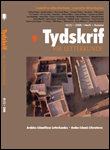The dialectics of homeland and identity: Reconstructing Africa in the poetry of Langston Hughes and Mohamed Al-Fayturi
DOI :
https://doi.org/10.17159/2309-9070/tvl.v.45i1.4460Mots-clés :
slavery, colonisation, racism, identityRésumé
The article investigates the dialectics between homeland and identity in the poetry of the Sudanese poet, Mohamed Al-Fayturi and his literary master, Langston Hughes in order to underline their attitudes toward crucial issues integral to the African and African-American experience such as identity, racism, enslavement and colonisation. The article argues that – in Hughes’s early poetry –Africa is depicted as the land of ancient civilisations in order to strengthen African-American feelings of ethnic pride during the Harlem Renaissance. This idealistic image of a pre-slavery, a pre-colonial Africa, argues the paper, disappears from the poetry of Hughes, after the Harlem Renaissance, to be replaced with a more realistic image of Africa under colonisation. The article also demonstrates that unlike Hughes, who attempts to romanticize Africa, Al-Fayturi rejects a romantic confrontation with the roots. Interrogating western colonial narratives about Africa, Al-Fayturi reconstructs pre-colonial African history in order to reveal the tragic consequences of colonisation and slavery upon the psyche of the African people. The article also points out that in their attempts to confront the oppressive powers which aim to erase the identity of their peoples, Hughes and Al-Fayturi explore areas of overlap drama between the turbulent experience of African-Americans and the catastrophic history of black Africans dismantling colonial narratives and erecting their own cultural mythology.
Téléchargements
Références
...
Téléchargements
Publiée
Numéro
Rubrique
Licence
(c) Copyright Tydskrif vir Letterkunde 2008

Ce travail est disponible sous licence Creative Commons Attribution - Partage dans les Mêmes Conditions 4.0 International.


 https://orcid.org/0000-0001-6465-6584
https://orcid.org/0000-0001-6465-6584


.png)